Lcd companion boards support (VKLCD50RTA & VKLCD70RT)
What is this ?
This is a demo program using Renesas RGA library & USB Camera to demonstrate VK-RZ/A1H's companion boards workability.
Supported companion Boards:
VKLCD50RTA
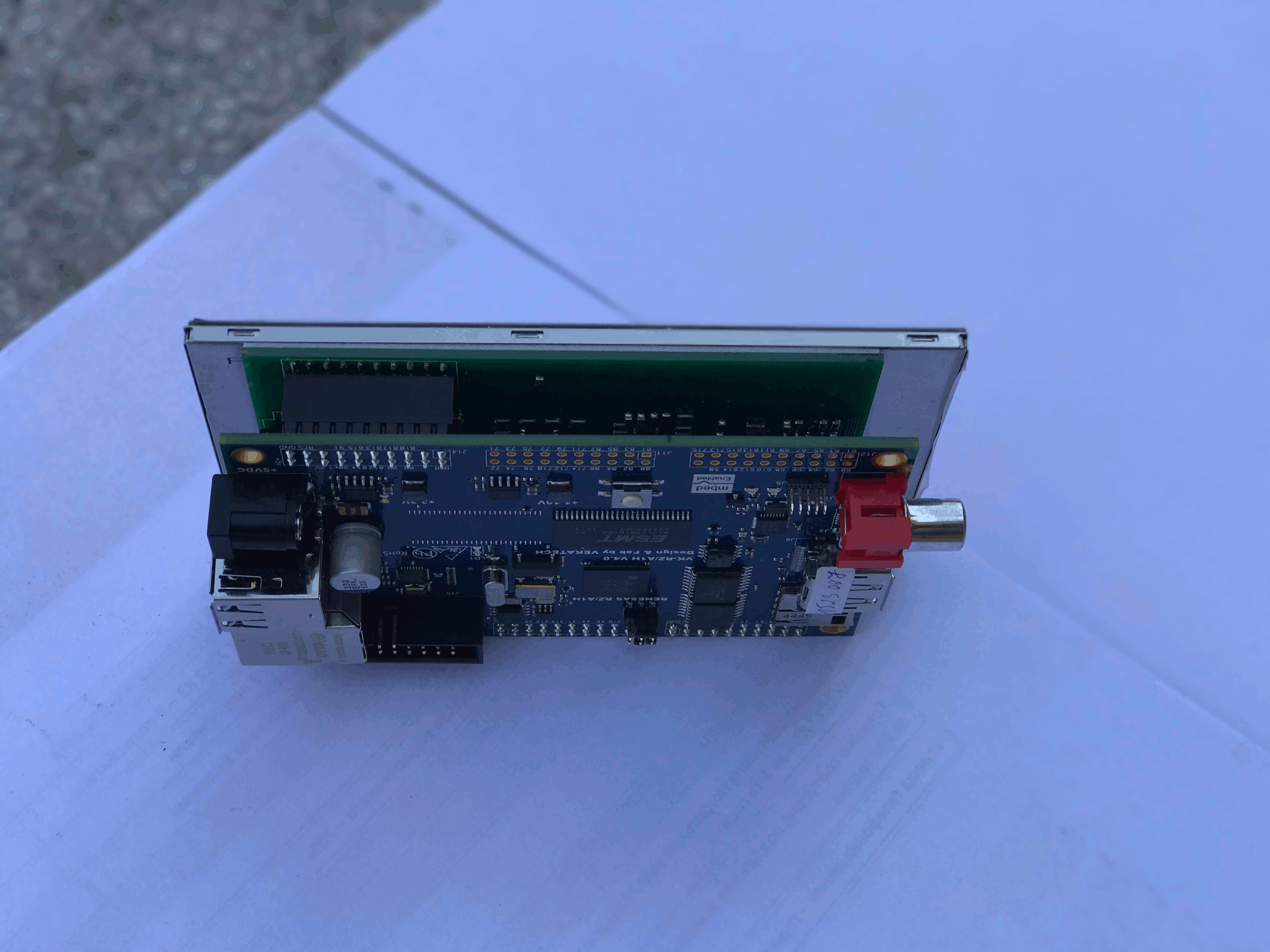
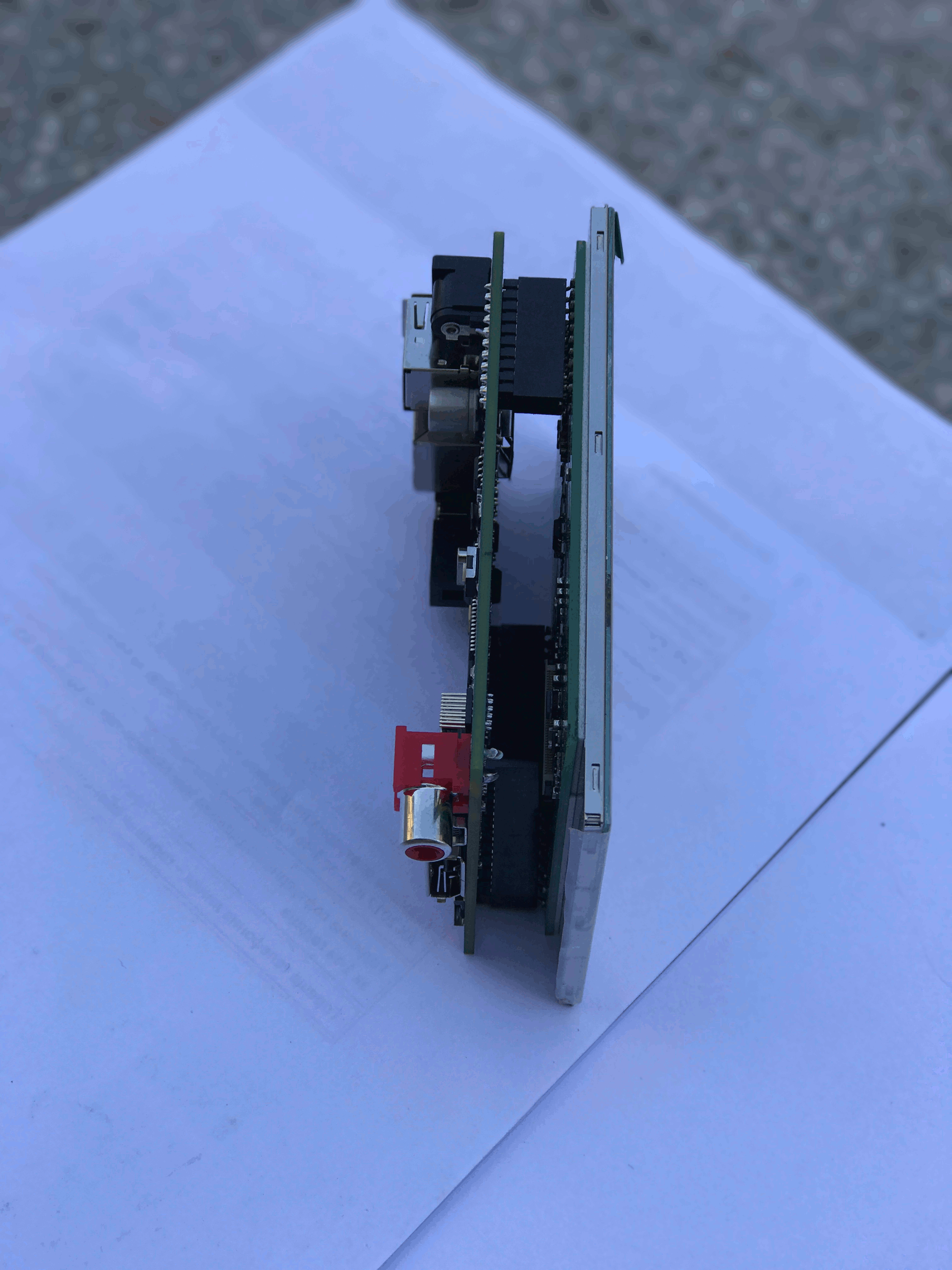
VKLCD70RT
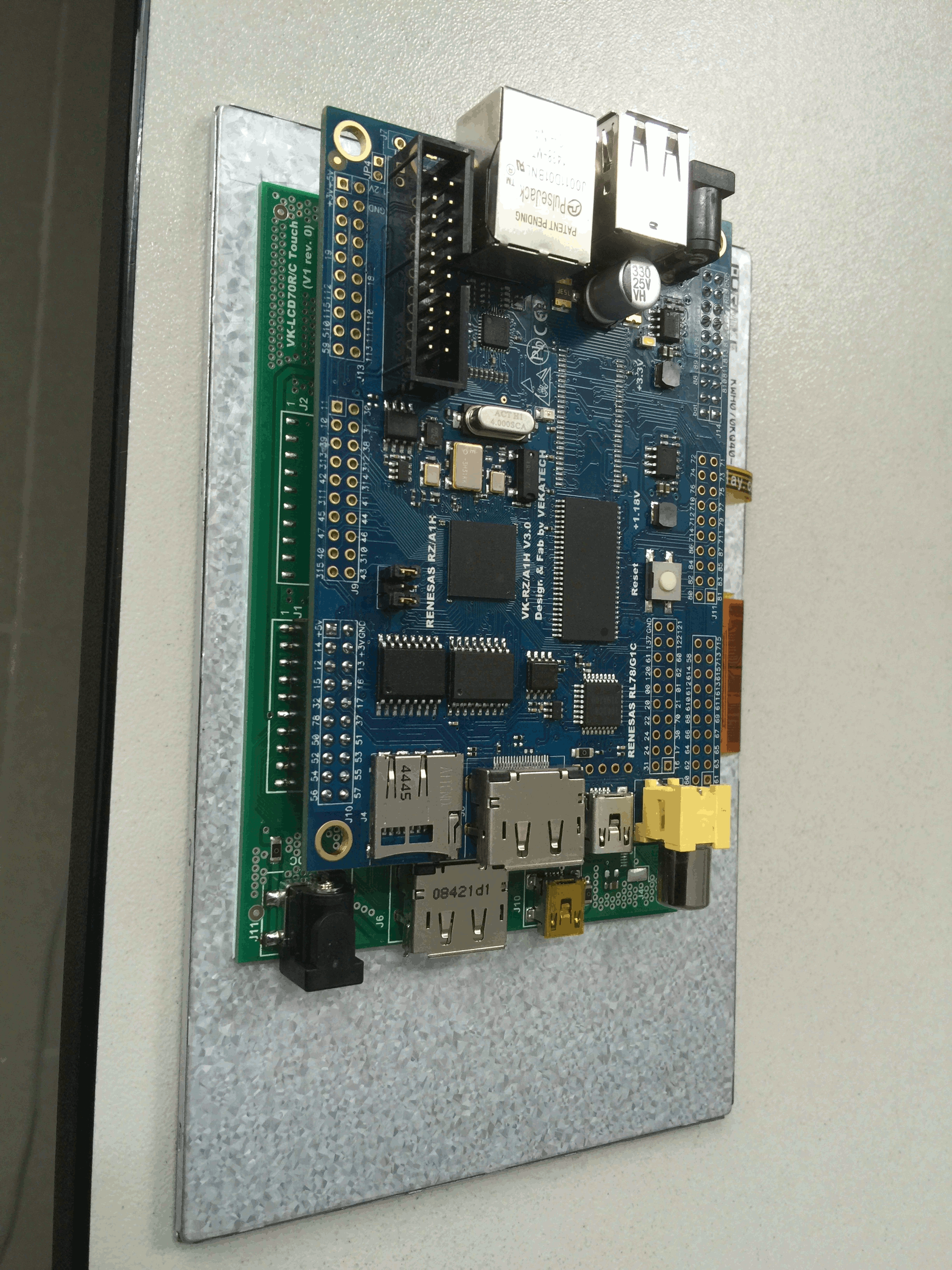
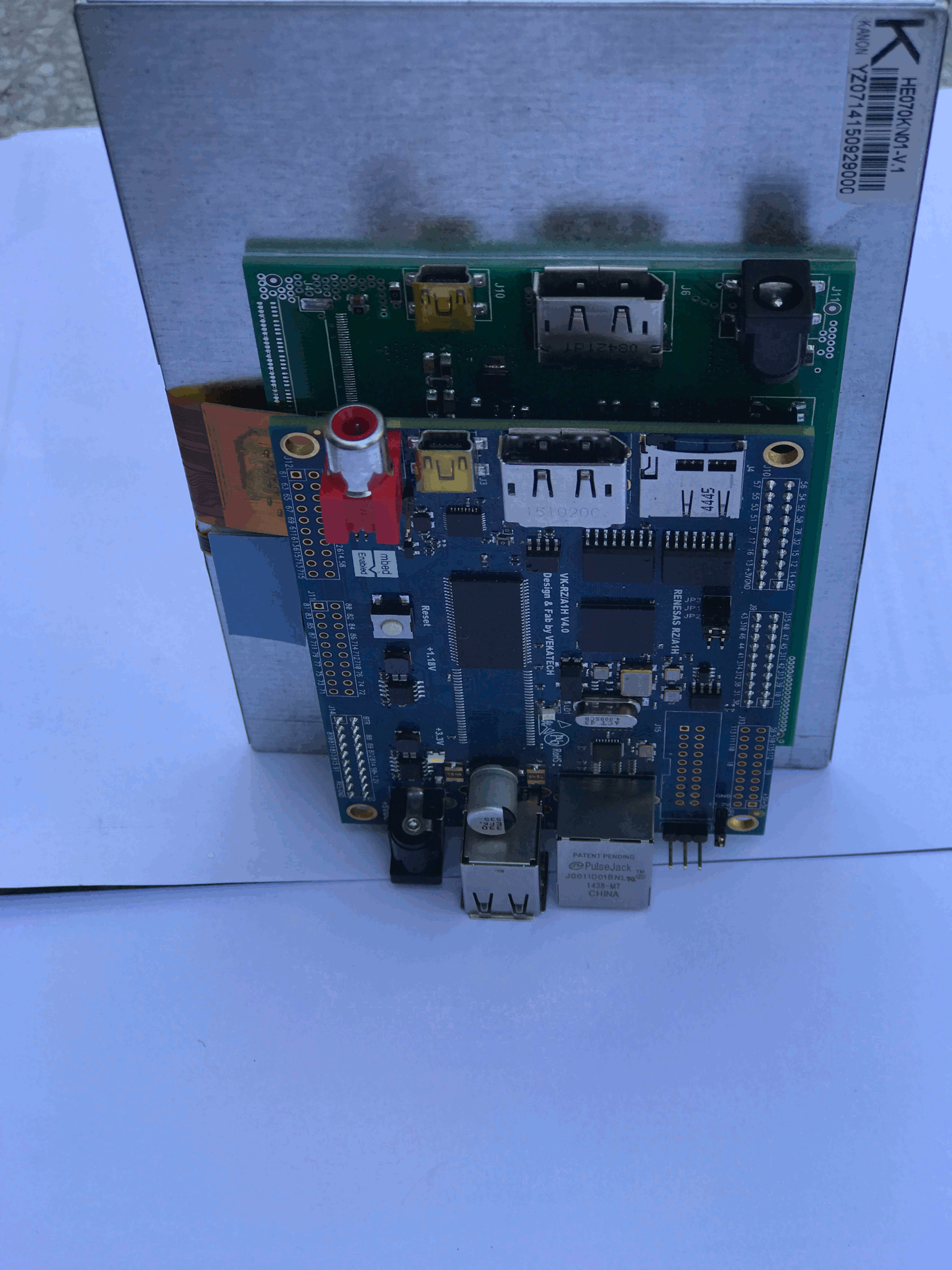
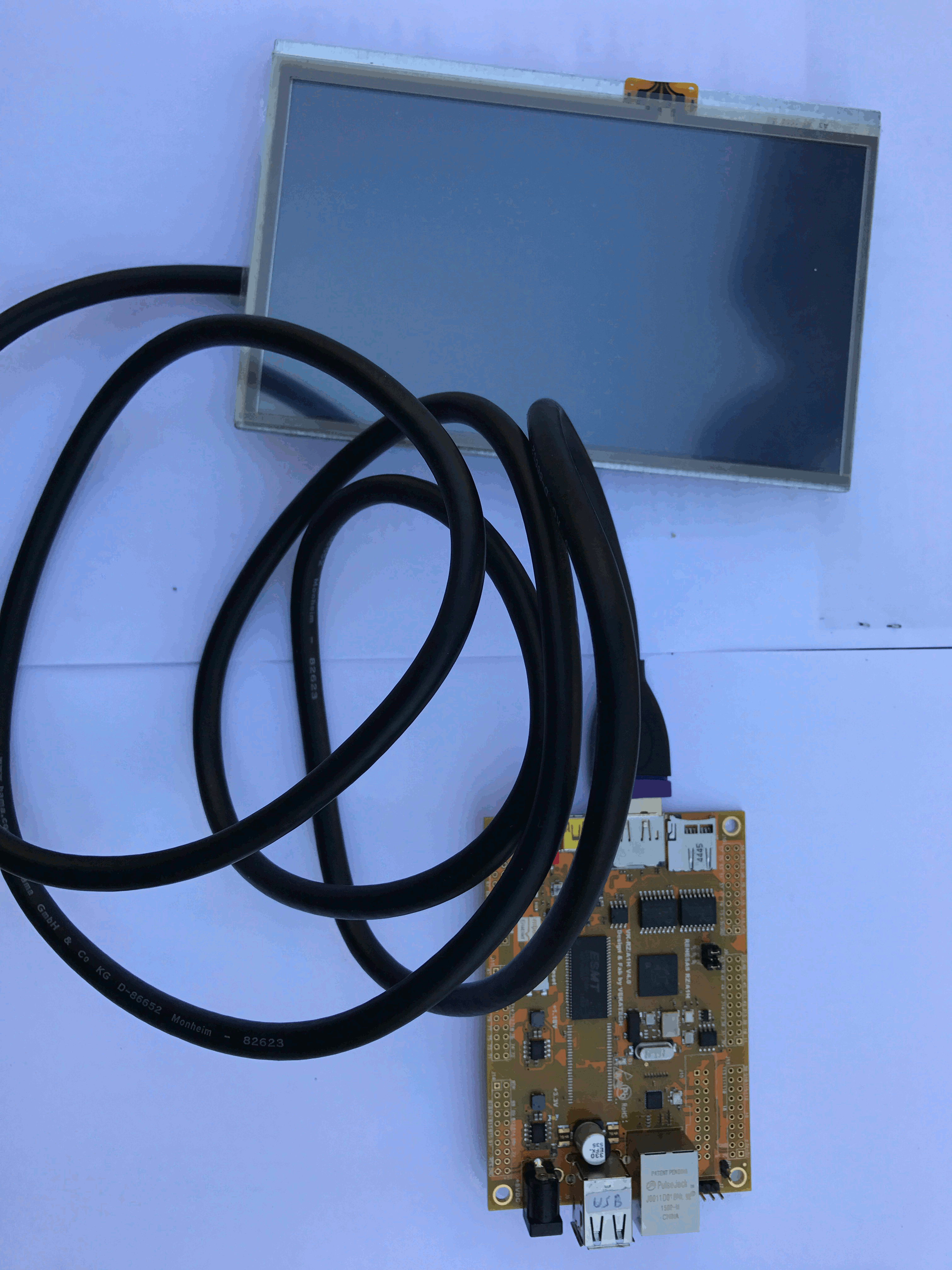
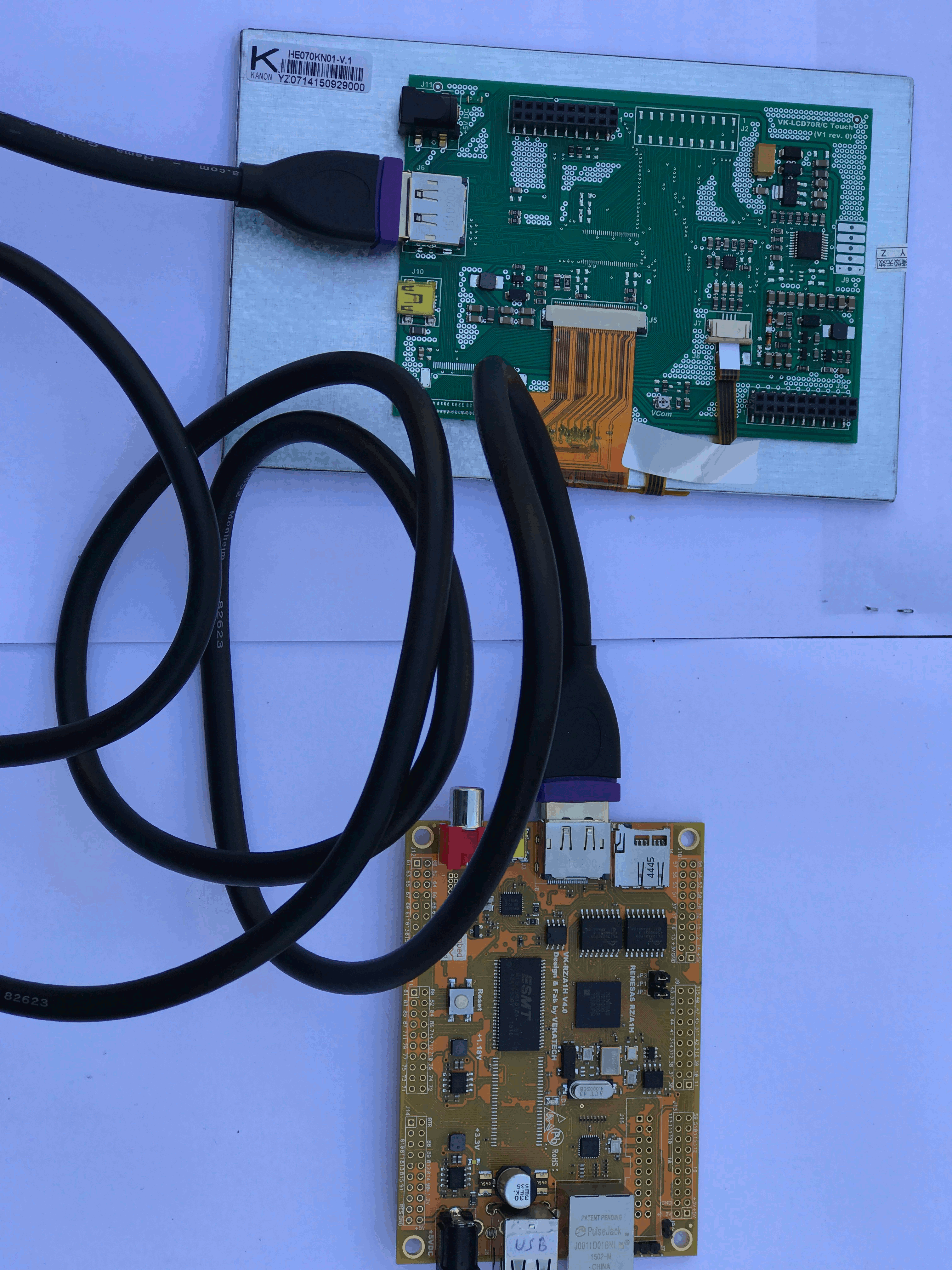
How to Configure ?
You can choose which display is installed by altering the lcd_panel.h file
Leave the active one & comment out the others:
#define LCD_VDC5_CH0_PANEL LCD_CH0_PANEL_VKLCD50RTA //#define LCD_VDC5_CH0_PANEL LCD_CH0_PANEL_VKLCD70RT
You can alter the whole demo with your pictures if you like:
How to compile ?
- The Demo can be compiled in 3 modes:
- I. Execution from the internal 10-MB on-chip SRAM.
- II. Execution from the on-board serial FALSH in dual (32-MB) mode.
- After import in the online compiler just leave only the VKRZA1H_DOUBLE.sct & delete all others linker files in the TOOLCHAIN_ARM_STD folder.
- Drag & drop the result binary in MBED disk, (previously inited in double flash mode)
- III. Execution from the on-board serial FALSH in single (16-MB) mode.
- After import in the online compiler just leave only the VKRZA1H_SINGLE.sct & delete all others linker files in the TOOLCHAIN_ARM_STD folder.
- Drag & drop the result binary in MBED disk, (previously inited in single flash mode )
Quick presentation:
Other demos ?
More demos you can find on our FTP
hal/common/I2CSlave.cpp@0:6435b67ad23c, 2017-02-16 (annotated)
- Committer:
- tvendov
- Date:
- Thu Feb 16 10:23:48 2017 +0000
- Revision:
- 0:6435b67ad23c
Initial lcd support (VKLCD50RTA & VKLCD70RT companion boards)
Who changed what in which revision?
| User | Revision | Line number | New contents of line |
|---|---|---|---|
| tvendov | 0:6435b67ad23c | 1 | /* mbed Microcontroller Library |
| tvendov | 0:6435b67ad23c | 2 | * Copyright (c) 2006-2013 ARM Limited |
| tvendov | 0:6435b67ad23c | 3 | * |
| tvendov | 0:6435b67ad23c | 4 | * Licensed under the Apache License, Version 2.0 (the "License"); |
| tvendov | 0:6435b67ad23c | 5 | * you may not use this file except in compliance with the License. |
| tvendov | 0:6435b67ad23c | 6 | * You may obtain a copy of the License at |
| tvendov | 0:6435b67ad23c | 7 | * |
| tvendov | 0:6435b67ad23c | 8 | * http://www.apache.org/licenses/LICENSE-2.0 |
| tvendov | 0:6435b67ad23c | 9 | * |
| tvendov | 0:6435b67ad23c | 10 | * Unless required by applicable law or agreed to in writing, software |
| tvendov | 0:6435b67ad23c | 11 | * distributed under the License is distributed on an "AS IS" BASIS, |
| tvendov | 0:6435b67ad23c | 12 | * WITHOUT WARRANTIES OR CONDITIONS OF ANY KIND, either express or implied. |
| tvendov | 0:6435b67ad23c | 13 | * See the License for the specific language governing permissions and |
| tvendov | 0:6435b67ad23c | 14 | * limitations under the License. |
| tvendov | 0:6435b67ad23c | 15 | */ |
| tvendov | 0:6435b67ad23c | 16 | #include "I2CSlave.h" |
| tvendov | 0:6435b67ad23c | 17 | |
| tvendov | 0:6435b67ad23c | 18 | #if DEVICE_I2CSLAVE |
| tvendov | 0:6435b67ad23c | 19 | |
| tvendov | 0:6435b67ad23c | 20 | namespace mbed { |
| tvendov | 0:6435b67ad23c | 21 | |
| tvendov | 0:6435b67ad23c | 22 | I2CSlave::I2CSlave(PinName sda, PinName scl) : _i2c() { |
| tvendov | 0:6435b67ad23c | 23 | i2c_init(&_i2c, sda, scl); |
| tvendov | 0:6435b67ad23c | 24 | i2c_frequency(&_i2c, 100000); |
| tvendov | 0:6435b67ad23c | 25 | i2c_slave_mode(&_i2c, 1); |
| tvendov | 0:6435b67ad23c | 26 | } |
| tvendov | 0:6435b67ad23c | 27 | |
| tvendov | 0:6435b67ad23c | 28 | void I2CSlave::frequency(int hz) { |
| tvendov | 0:6435b67ad23c | 29 | i2c_frequency(&_i2c, hz); |
| tvendov | 0:6435b67ad23c | 30 | } |
| tvendov | 0:6435b67ad23c | 31 | |
| tvendov | 0:6435b67ad23c | 32 | void I2CSlave::address(int address) { |
| tvendov | 0:6435b67ad23c | 33 | int addr = (address & 0xFF) | 1; |
| tvendov | 0:6435b67ad23c | 34 | i2c_slave_address(&_i2c, 0, addr, 0); |
| tvendov | 0:6435b67ad23c | 35 | } |
| tvendov | 0:6435b67ad23c | 36 | |
| tvendov | 0:6435b67ad23c | 37 | int I2CSlave::receive(void) { |
| tvendov | 0:6435b67ad23c | 38 | return i2c_slave_receive(&_i2c); |
| tvendov | 0:6435b67ad23c | 39 | } |
| tvendov | 0:6435b67ad23c | 40 | |
| tvendov | 0:6435b67ad23c | 41 | int I2CSlave::read(char *data, int length) { |
| tvendov | 0:6435b67ad23c | 42 | return i2c_slave_read(&_i2c, data, length) != length; |
| tvendov | 0:6435b67ad23c | 43 | } |
| tvendov | 0:6435b67ad23c | 44 | |
| tvendov | 0:6435b67ad23c | 45 | int I2CSlave::read(void) { |
| tvendov | 0:6435b67ad23c | 46 | return i2c_byte_read(&_i2c, 0); |
| tvendov | 0:6435b67ad23c | 47 | } |
| tvendov | 0:6435b67ad23c | 48 | |
| tvendov | 0:6435b67ad23c | 49 | int I2CSlave::write(const char *data, int length) { |
| tvendov | 0:6435b67ad23c | 50 | return i2c_slave_write(&_i2c, data, length) != length; |
| tvendov | 0:6435b67ad23c | 51 | } |
| tvendov | 0:6435b67ad23c | 52 | |
| tvendov | 0:6435b67ad23c | 53 | int I2CSlave::write(int data) { |
| tvendov | 0:6435b67ad23c | 54 | return i2c_byte_write(&_i2c, data); |
| tvendov | 0:6435b67ad23c | 55 | } |
| tvendov | 0:6435b67ad23c | 56 | |
| tvendov | 0:6435b67ad23c | 57 | void I2CSlave::stop(void) { |
| tvendov | 0:6435b67ad23c | 58 | i2c_stop(&_i2c); |
| tvendov | 0:6435b67ad23c | 59 | } |
| tvendov | 0:6435b67ad23c | 60 | |
| tvendov | 0:6435b67ad23c | 61 | } |
| tvendov | 0:6435b67ad23c | 62 | |
| tvendov | 0:6435b67ad23c | 63 | #endif |
| tvendov | 0:6435b67ad23c | 64 |